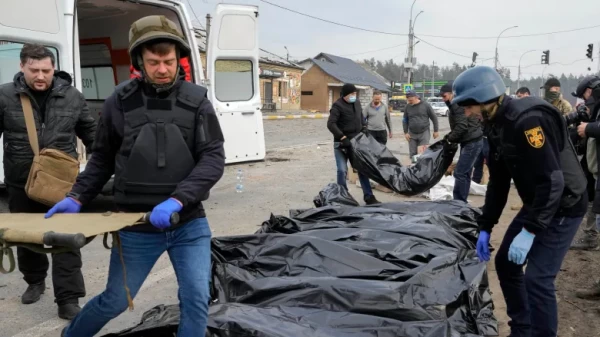
Volunteers and soldiers collect bodies of civilians killed by Russian forces at the destroyed bridge in Irpin close to Kyiv, Ukraine. (Associated Press/Efrem Lukatsky)
Under international law, genocide is an intent to destroy - in whole or in part - a national, ethnic, racial or religious group. Genocide has a strict legal definition and has rarely been proven in court since it was established in law after the Holocaust.
In its statement, the Latvian parliament cited "evidence of mass brutal crimes committed by the army of the Russian Federation, including the murder, torture, sexual abuse and desecration of Ukrainian civilians, including women and children, in Bucha, Irpin, Mariupol and elsewhere".
Estonia's parliament cited "murders, enforced disappearances, deportations, imprisonment, torture, rape, and desecration of corpses".
On Feb. 28, four days into the invasion, International Criminal Court chief prosecutor Karim Khan said he had opened a formal investigation into alleged war crimes and crimes against humanity in Ukraine. A month later he urged countries to back his investigation and on April 14 said he would keep trying to get Russia to engage with the inquiry. read more
An initial report by a mission of experts set up by the Organization for Security and Cooperation in Europe, the continent's top security and rights watchdog, documents a "catalogue of inhumanity" by Russian troops in Ukraine, according to the U.S. ambassador to the OSCE.
Advertisement / Reklaam
Advertisement / Reklaam
This included, Ambassador Michael Carpenter said, evidence of "direct targeting of civilians, attacks on medical facilities, rape, executions, looting and forced deportation of civilians to Russia".French President Emmanuel Macron said that using the word "genocide" would amount to verbal escalation that would complicate his efforts to bring peace to Ukraine.

